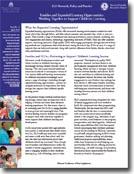The Harvard Family Research Project separated from the Harvard Graduate School of Education to become the Global Family Research Project as of January 1, 2017. It is no longer affiliated with Harvard University.
Q&A with HFRP Researchers on Families and Expanded Learning Opportunities
June 5, 2012

What is an Expanded Learning Opportunity?
Expanded learning opportunities (ELOs) offer structured learning environments outside the traditional school day, before and after school; throughout the summer; and in extended-day, -week or -year programs.
In April, we released the second policy brief in our series with the National Conference of State Legislatures (NCSL), entitled Families and Expanded Learning Opportunities: Working Together to Support Children's Learning. The brief explores the ways that families and expanded learning opportunities (ELOs)—including afterschool and other out-of-school time programs—must work as equal partners in order to ensure ELOs are contributing to children's learning in meaningful ways.
NCSL interviewed Harvard Family Research Project (HFRP) researchers Heidi Rosenberg and Erin Harris about the brief:
NCSL: Why is it important to engage parents and families in a child’s education?
HFRP: Children learn in multiple settings, including in schools; through expanded learning opportunities (ELOs), such as afterschool and summer programs; and at home. As the primary bridge between these settings, parents play a critical role in ensuring that these learning environments are meeting their children’s specific educational needs. To be most effective, parental involvement must go beyond occasional participation in school and out-of-school activities and develop into a deeper kind of engagement—one where parents work as equal partners with schools and ELOs toward the goal of supporting children’s education. Families and Expanded Learning Opportunities explores specific responsibilities families and ELOs can share to ensure ELOs provide the most beneficial learning opportunities.
NCSL: Why have ELO programs found it valuable to engage families—isn’t this already being done by some schools?
HFRP: Families need to be engaged in all of the settings in which their children learn—including, but not limited to, schools. Family engagement in ELOs is especially important because schools often have limited time or funding to engage families. Parents are also sometimes intimidated or distrustful of schools and may be more comfortable interacting with and approaching ELO program staff. ELO staff can communicate to parents not only about their children’s learning in the program, but they may also have connections to the school, and thus can share important information about the school with parents as well.
NCSL: What types of benefits do parents and ELO programs see as a result of this engagement?
HFRP: Family engagement in ELOs has been linked to positive youth outcomes, such as improved behavior, well-being, and school success. It has also been found to support better relationships between parents and children.
NCSL: How can ELOs and parents work together to support children’s education?
HFRP: Parents and ELOs can partner to support children’s education by working together to understand children’s learning needs and to ensure that these needs are being addressed through the program. They can also work as partners to facilitate communication across other learning settings and share key data on children’s learning progress. ELOs can also provide parents with ideas for extending the program’s learning benefits through related activities at home and in the community.
NCSL: What do the findings on ELOs and family engagement mean for legislators and legislative staff?
HFRP: Since family engagement in ELOs helps to ensure that children’s educational needs are being met, legislatures should consider the role of ELOs as they draft policies to encourage, coordinate and support family engagement in education. As state and community leaders, legislators can also help publicize the ELOs that are successfully implementing effective family engagement strategies.
Interested in learning more? Read Families and Expanded Learning Opportunities: Working Together to Support Children's Learning.
